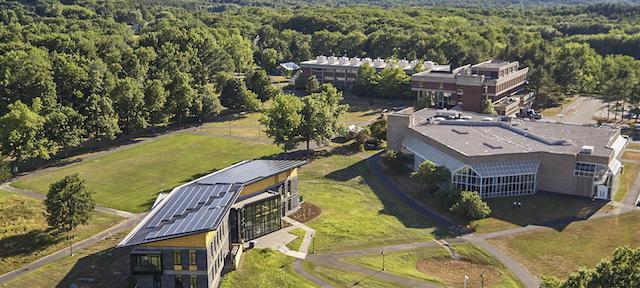Hampshire Well-Equipped to Pivot During Crisis, Extends Deposit Deadline

Hampshire College is moving its deadline for admissions deposits for fall enrollment to June 1, as a show of support for accepted students and their families and the challenges presented this spring by the global pandemic. The extension applies to approximately 650 students accepted to join Hampshire’s 50th anniversary class in the fall.
“Our families are having to adapt to new circumstances this spring, including disruptions to high school and changes to personal and financial circumstances,” said Dean of Admissions and Financial Aid Fumio Sugihara. “Students need time to make informed decisions about their future and to meet this next critical stage of their lives with confidence.”
Virtual Accepted Student Days and Online Tours Offered
Responding to the pandemic, Hampshire has also moved all its admissions tours and Accepted Student Days online, offering virtual events and campus tours and connecting with prospective students via personal communications. The deposit extension will give students more time to get to know Hampshire through these virtual offerings, which provide a fun and informative platform for students to experience Hampshire’s distinct education.
Virtual sessions held via Zoom include:
- Meetings with President Ed Wingenbach and Fumio Sugihara
- Information sessions on Hampshire’s pioneering academic program by incoming Dean of Faculty Christoph Cox, Hampshire professors, and fourth-year students
- A student life Q & A session hosted by Hampshire students and moderated by Student Life staff
- Meetings with recent alumni hosted by the Office of Alumni and Family Relations
- A discussion with Hampshire faculty about the relevance of Hampshire’s education considering today’s global pandemic
“These adaptations are examples of the many ways Hampshire is actively responding to the unprecedented challenges presented by the Covid-19 outbreak,” said President Wingenbach. “Hampshire has distinct advantages—we are creative, innovative, and experimenting, and not burdened by rigid requirements. We’re celebrating the launch of our second half century as partners in the Five College consortium. I believe these better position us to survive this trying period.”
An end to this epidemic will require leaders grounded in ethical decision-making, trained in entrepreneurial approaches, and able to ask new questions. It’s a perfect example of the value of Hampshire’s transdisciplinary approach.
President Ed Wingenbach
Innovative New Curriculum Matches the Moment
To mark its 50th anniversary this fall, Hampshire will launch a bold new curriculum to prepare students to engage in complex, pressing issues and questions of the 21st century. Departing completely from traditional college majors and siloed academic departments, the College’s new direction intentionally prepares students for a future of constant and rapid change, in which graduates will need to apply advanced skills and innovate continually.
Hampshire students will continue to design their own program mentored by faculty and access the free offerings of its partners in the Five College Consortium: Amherst, Mount Holyoke, and Smith Colleges, and UMass Amherst.
Wingenbach has noted that the events of this spring demonstrate the importance of Hampshire’s educational approach, because responding to a global pandemic requires citizens who look at a problem or question well beyond the limits of disciplines. “Addressing the pandemic involves science, health, politics, history, psychology, arts, music, the media, storytelling, and more,” he said. “An end to this epidemic will require leaders grounded in ethical decision-making, trained in entrepreneurial approaches, and able to ask new questions. It’s a perfect example of the value of Hampshire’s transdisciplinary approach.”
While Covid-19 may be an extreme test, it illustrates that every significant and meaningful challenge today’s graduates will encounter will require them to grapple with complexity and uncertainty, and develop creative solutions. A Hampshire College education is designed with these skills at the center. The new curriculum addresses recommendations that U.S. colleges prepare graduates not just for entry-level roles but for long-term advancement.
Unlike colleges where students check off menus of credit requirements, Hampshire is a competency-based college: at the end of their first year, students present a plan for their personalized program, and then advance through three divisions, demonstrating progress by presenting projects and portfolios to their advisors. Its new curriculum will also incorporate learning cross-cultural skills, essential skills in an increasingly diverse world and global economy.
Its inventive new program invites students to:
- actively engage in complex questions and issues starting from their first semester;
- explore and innovate freely across any fields of knowledge; and
- develop lifelong entrepreneurial skills including creative problem-solving, applied critical thinking, and resiliency, as each student designs the questions that drive them into their personal program, a hallmark of a Hampshire education.
Hampshire continues to build on its legacy of academic innovation. The College was founded by its partners in the Five College Consortium as a major departure from traditional colleges. Hampshire’s founding document, The Making of a College (1966), rejected passive lectures and exams and identified active inquiry as the heart of its program. Its founders defined one of the College’s main goals to be enlarging the capability of each student to conduct their own learning, by educating them in the use of intellectual tools for independent work.
Many of the innovations pioneered by Hampshire have become standard features of American higher education. Hampshire’s new curriculum continues this path of innovation, and puts the College once again at the leading edge of higher ed.

